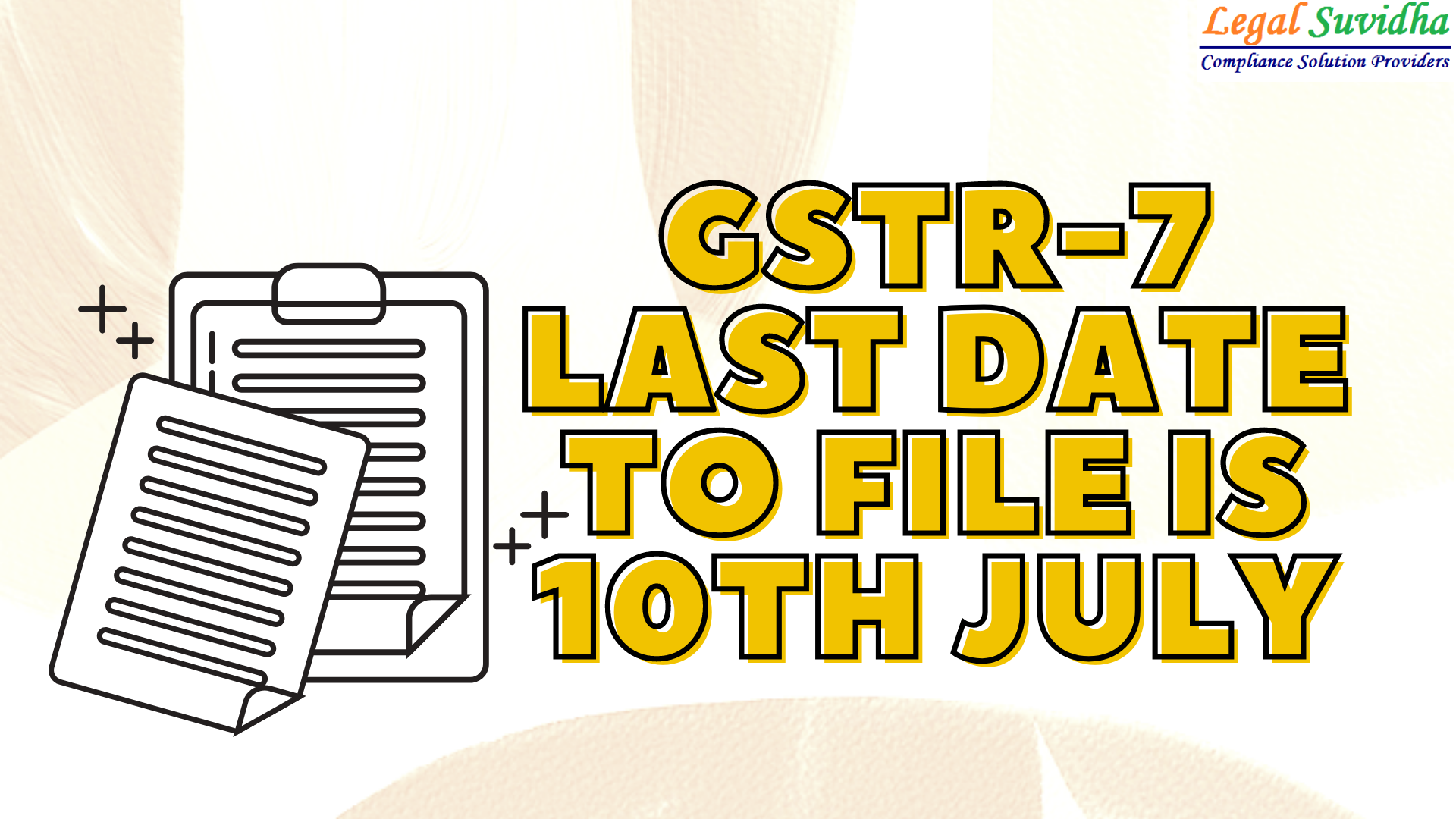GSTN: DEDUCTORS TO FILE FORM GSTR-7 BEFORE 10TH JULY
What is GSTR-7?
GSTR-7 is a return filed by the individual who deducts TDS under GST. GSTR-7 contains details of the TDS deducted, TDS liability payable and paid, TDS refund claimed, etc.
Who can deduct TDS under GST?
As per the GST law, the following individuals/entities can deduct TDS :
- A department or establishment of the Central or state government
- A local authority
- Governmental agencies
- Persons or categories of persons as may be notified by the Central or a state government on the Council’s recommendations
- An authority, a board, or any other body set up by the Parliament, a State Legislature, or by a government with 51% equity (control) owned by the government
- A society established by the Central or any state government or a local authority and the society registered under the Societies Registration Act, 1860
- Public sector undertakings
The above deductors must deduct TDS where the total value of supply under the contract exceeds Rs.2.5 lakh. The rate for TDS is 2% (CGST 1% + SGST 1%) in case of intrastate supply and 2% (IGST) in case of interstate supplies. However, TDS will not be deducted when the location of the supplier and place of supply is different from the registration place (state) of the recipient.
Why is GSTR-7 important?
GSTR-7 shows the details of TDS deducted, amount of TDS paid and payable, and any refund of TDS claimed. The deductee (the person whose name TDS has been deducted) can claim TDS as Input Tax Credit (ITC) and utilize it to pay the output tax liability.
The details of TDS deducted is available electronically to each of the deductees in PART ‘C’ of Form GSTR-2A after the due date of filing of Form GSTR-7. Also, the certificate for such TDS deducted shall be available in Form GSTR-7A based on the return filed in GSTR-7.
GSTN REMINDS DEDUCTORS TO FILE GSTR-7 BEFORE 10th JULY:
The Goods and Services Tax Network (GSTN) today issued a reminder for taxpayers to file GSTR-7.
GSTR 7 is a return that has to be filed by taxpayers who wish to deduct their TDS from GST returns. 10th July 2022 is the last date for filing two GST returns, including GSTR-7 and GSTR-8.
GSTR-8 is a return to be filed by the e-commerce operators who are required to deduct TCS (Tax collected at source) under GST. GSTR-8 contains the details of supplies effected through e-commerce platform and amount of TCS collected on such supplies.
The failure to file a GST return will attract a penalty of Rs 100 under CGST and Rs 100 under SGST shall be levied, and the total will be Rs 200 per day. However, the maximum late fee should not exceed Rs 5,000.
There is no late fee on IGST in case of delayed filing. Along with late fees, interest has to be paid at 18% per annum. It has to be calculated on the TDS to be paid. The period for interest calculation will be from the next day of the due date of filing to the payment date
What are the details required in GSTR-7?
GSTR-7 has a total of eight sections, which are explained below.
1. Provide GSTIN: Each taxpayer will be allotted a state-wise PAN-based 15-digit Goods and Services Taxpayer Identification Number (GSTIN). GSTIN of the taxpayer will be auto-populated at the time of return filing.
2. Legal name of the deductor: The taxpayer’s name will be auto-populated when logging into the common GST portal. Also, if there is any registered person’s trade name, it will get auto-populated.
3. Details of the tax deducted at source: Here, you need to mention the details of the TDS deducted such as GSTIN of the deductee, total amount and TDS amount (central/state/integrated).
4. Changes to details of TDS for any earlier tax period: Any correction to the data submitted in the return of previous months can be done here by filling the original and revised details. Based on this amendment, the TDS certificate (GSTR-7A) will be revised.
5. Tax deduction at source and paid: Here, you need to mention the tax (integrated/central/state) amount deducted from the deductee and the tax (integrated/central/state) amount paid to the government.
6. Interest, late fee payable, and paid: If there is any interest or late fees applicable on the TDS amount, you must mention the details of such interest and late fees payable along with the amount paid to date.
7. Refund claimed from electronic cash ledger: If you want to claim the refund of TDS from your electronic cash ledger, you must mention such details in this section. You should also provide your bank details where the refund for TDS should be credited.
8. Debit entries in electronic cash ledger for TDS/interest payment [to be populated after payment of tax and submissions of return]: The entries in the section are auto-populated once you finish filling the return and the payment of TDS along with interest if any.







